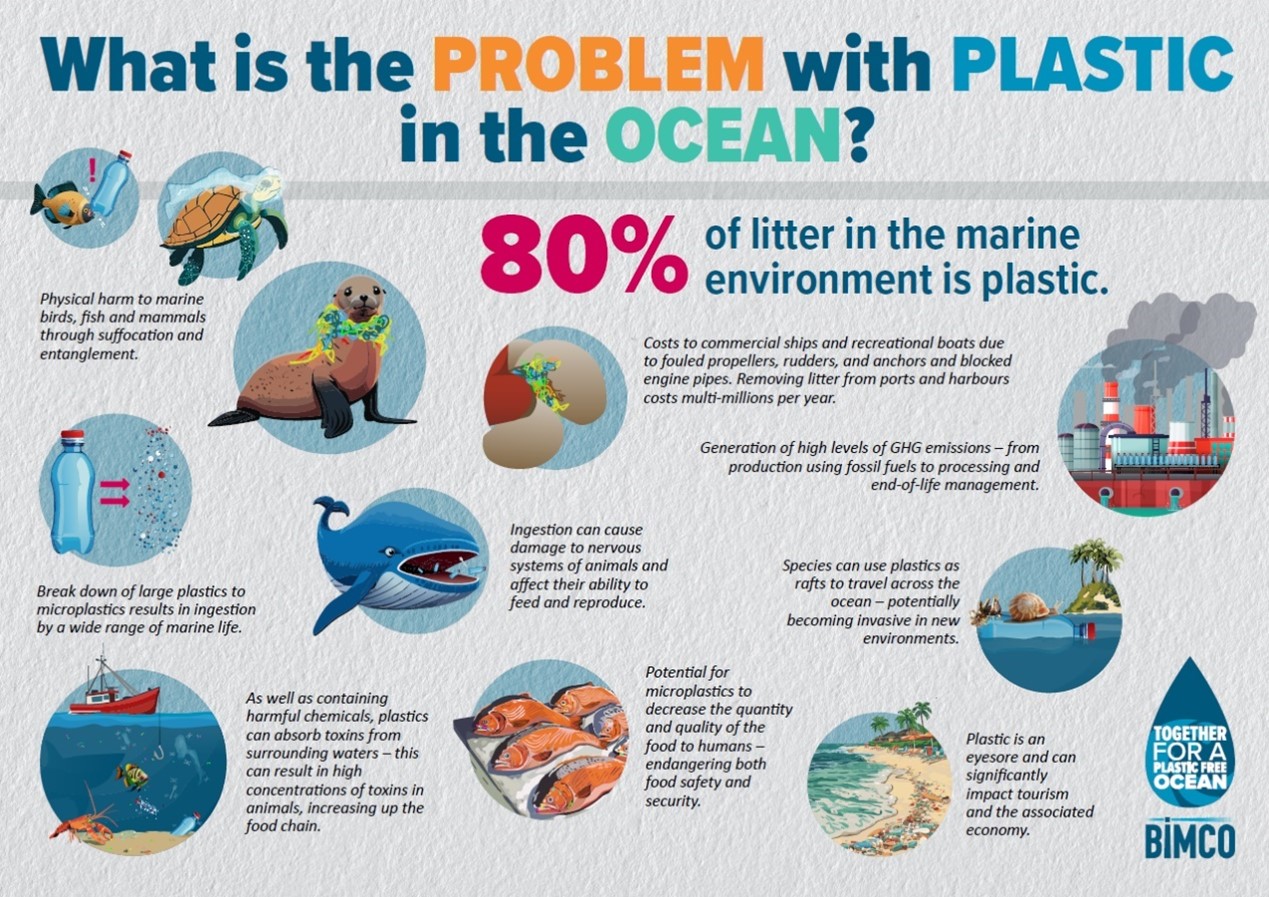Plastic pollution at sea is a significant environmental issue because of the devastating impact it has on marine ecosystems, biodiversity, and human health.
Plastics are non-biodegradable, meaning they can persist in the environment for many years. Over time, larger plastic items break down into microplastics, which are tiny particles that can be ingested by marine life, entering the food chain and causing harm to animals at every level.
Species such as fish, seabirds, and marine mammals can ingest or become entangled in plastic debris, leading to injury, starvation, or death. Beyond the immediate harm to wildlife, plastic pollution disrupts entire marine ecosystems and undermines their ability to function effectively, impacting industries that rely on healthy oceans and local communities that rely on fishing.
Moreover, better waste management practices, including the proper storage, handling, and disposal of waste at designated port reception facilities, can prevent accidental discharges at sea.
The issue with plastic water bottles
BIMCO has recently published a guide called “The Art and Science of Removing Single-Use Plastic Bottles from Ships” to tackle the issue. According to BIMCO, if we assume that all ships are providing drinking water for seafarers in plastic bottles, then approximately one billion plastic bottles a year are being used on commercial ships. The following figures are derived from a survey of BIMCO members undertaken in 2021:
- On average, seafarers use between one and two 1.5-liter bottles per day.
- The average number of seafarers per ship is approximately 25, resulting in 25 to 50 bottles per ship per day.
- The number of bottles consumed per ship per year is between 9,000 and 18,000 (average 13,500).
- With approximately 60,000 merchant ships in the global fleet, between 540 million and 1.08 billion plastic bottles per year are used by the industry (average 810 million).
Considering that plastic is the largest, most harmful and most persistent type of marine litter accounting for around 85%, having this many plastic bottles in the ocean is a great issue.
International regulations prohibiting plastic waste
As explained by BIMCO, the regulation covering the disposal of plastic at sea is clear – discharge of all plastics into the sea from ships is prohibited. As such, plastic waste generated on a ship needs to be managed on board and discharged to port reception facilities.
There are certain international regulations that see to that such as:
MARPOL Annex V
As already mentioned in other sections of this edition, MARPOL Annex V, which addresses waste management including plastics, is the key document for the industry. This regulation prohibits the disposal of plastics, of any kind, into the sea.
Ships must follow waste-handling procedures. All ships of 100 gross tonnage and above, every ship certified to carry 15 persons or more, and every fixed or floating platform must carry a garbage management plan on board, which includes written procedures for minimizing, collecting, storing, processing and disposing of garbage, including the use of the equipment on board.
Furthermore, the date, time, position of the ship, description of the garbage and the estimated amount incinerated or discharged must be logged and signed into the Garbage Record Book. The Book must be kept for a period of two years after the date of the last entry.
Finally, MO’s Sub-Committee on Pollution Prevention and Response (PPR 11) agreed draft recommendations for the carriage of plastic pellets by sea, along with draft guidelines for cleaning up plastic pellet spills from ships.

London Convention
The London Convention (1972) and its 1996 Protocol further bolster marine pollution controls. The Protocol introduces a reverse list that bans the dumping of all materials except those explicitly permitted, requiring permits for any allowed materials. It also prohibits the incineration of waste at sea, including plastics, thereby enhancing efforts to reduce ocean pollution.
Moreover, whilst the existing global regulatory framework for shipping does not work on premise of banning certain plastics from being used on board, some country specific regulation is in place that prevents or limits certain plastics from being used, BIMCO clarifies.
For instance, India enacted stringent regulations against single-use plastics as of October 2019. This ban applied to both Indian and foreign ships within Indian territorial waters and targets items like water bottles, plastic bags, and disposable cutlery. Ships were required to gradually phase out these items, with targets of reducing SUP use by 50% by April 2020, 75% by July 2020, and 90% by October 2020.
Best practices to reduce plastic use onboard
Reducing plastic waste is not just about meeting regulatory requirements—it’s a crucial aspect of sustainability. To effectively address this issue and enhance environmental responsibility, consider implementing these 10 best practices:
#1 Implement reusable alternatives
Replace single-use plastic items like water bottles, cutlery, and food containers with reusable items made of stainless steel, glass, or other durable materials.
#2 Install water filtration systems
Provide water filtration systems on ships to eliminate the need for bottled water. Crew members can use refillable water bottles instead of plastic bottles.
#3 Ban single-use plastics
Prohibit the use of single-use plastics such as plastic bags, straws, and packaging materials on board. Encourage biodegradable or reusable alternatives.
#4 Bulk purchase and dispensing
Purchase items such as cleaning supplies, toiletries, and foodstuffs in bulk and use refillable dispensers to minimize plastic packaging waste.
#5 Introduce a garbage management plan
Ensure every ship has a well-documented garbage management plan that focuses on waste reduction, segregation, recycling, and proper disposal of plastics at port facilities.
#6 Conduct regular crew training
Provide training to crew members on waste management, recycling, and the environmental impact of plastic pollution.
#7 Set up onboard recycling programs
Set up designated recycling collection points onboard for materials like plastics, paper, metals, and glass. These clearly marked stations will streamline the sorting process, making it easier for crew members to properly separate recyclables and ensure efficient waste management.
#8 Track plastic use with logs
Maintain a logbook to track the inventory and usage of plastics onboard. This helps in identifying areas where plastic usage can be further reduced or eliminated.
#9 Regular audits and inspections
Conduct regular waste management audits and inspections onboard to ensure compliance with plastic reduction goals. Evaluate practices periodically and update procedures to align with the latest environmental standards.
#10 Change of mindset
Perhaps the most important step in eliminating plastic waste is a change of mindset. Plastic waste may be a global phenomenon with multiple causes, but significant strides can also be made on an individual level. Something as simple as not throwing a plastic bottle at sea -as self-explanatory as it may seem- makes a great difference.
Industry initiatives that address plastic pollution from ships
In 2021, IMO introduced the Strategy to Address Marine Plastic Litter from Ships. This strategy aims to eliminate plastic waste discharges from ships by 2025, despite existing regulations. It focuses on better enforcement of MARPOL Annex V, training for seafarers, and developing educational materials to promote best practices in marine environmental protection.
Additionally, in July 2024, IMO issued a call towards businesses operating in the shipping and fisheries sectors to join the Marine Plastic Litter Global Industry Alliance (GIA). The alliance will bring together maritime leaders, with the aim of developing innovative solutions to prevent and reduce ocean plastics, while addressing common barriers.
Looking forward
Keeping plastic away from our oceans is more than a matter of regulatory compliance. It’s a matter of respecting the environment and life on the planet. The world’s oceans are a pool of life and activity connecting all parts of the world. We should not take their sustainability for granted, but rather, we should actively ensure it.






























































